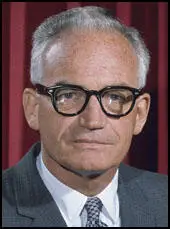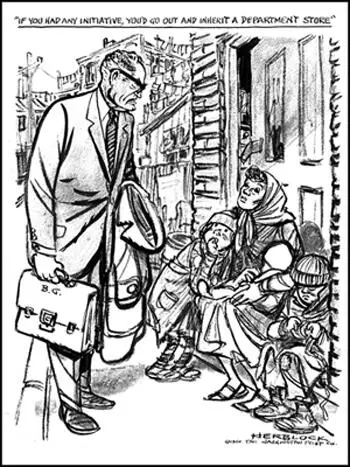Barry Goldwater

Barry Goldwater was born in Phoenix, Arizona on 1st January, 1909. His grandfather, a Polish immigrant, had established a large number of stores in Arizona in the 1870s. By the time Goldwater was born the family was extremely wealthy. Goldwater attended Staunton Military Academy and the University of Arizona, before joining the family department store business based in Phoenix.
After the death of his father in 1929, Goldwater played an important role in the development of the organization and in 1937 became head of the company. Goldwater was seen as a progressive employer and offered wages higher than the national retail-store average. The company also assumed the full cost of employees' health, accident, and life insurance. Other innovations included a profit-sharing plan and a maximum forty-hour week. Opposed to trade unions, Goldwater described his business strategy as "enlighten self-interest".
Goldwater found the strain of running such a large company difficult to take and had two nervous breakdowns in 1937 and 1939. Goldwater also started drinking heavily and made several unsuccessful attempts to give up alcohol.
On the outbreak of the Second World War, Goldwater joined the United States Air Force. Initially an instructor in the gunnery command, he later served overseas. By the time the war had finished in 1945, Goldwater had reached the rank of Brigadier General.
Goldwater had been an opponent of Franklin D. Roosevelt and the New Deal. He also had a strong dislike of Harry S. Truman and his progressive social policies. Goldwater joined the Republican Party and in 1952 was elected to the Senate. He immediately became a loyal supporter of Joe McCarthy and was one of only 22 senators who voted against his censure in December, 1954. He later recalled: "The anti-anticommunists were outraged at his claims that some of the principals in the Truman and Roosevelt administrations actively served the communist causes... The liberals mounted a skillfully orchestrated campaign of criticism against Joe McCarthy. Under the pressure of criticism, he reacted angrily. It is probably true that McCarthy drank too much, overstated his case, and refused to compromise, but he wasn't alone in his beliefs."

On the extreme right of the Republican Party, Goldwater often criticised the policies of Dwight Eisenhower. He described his social policies as "dime-store New Deal" and strongly opposed the President's decision to use federal troops at Little Rock. Goldwater also believed that Eisenhower was too soft on trade unions and complained that his failure to balance the budget.
Goldwater expressed his conservative views in a syndicated newspaper column. A collection of these articles were published as The Conscience of the Conservative in 1960. Considered to be too right-wing to be a presidential candidate, Goldwater loyally supported Richard Nixon against John F. Kennedy in 1960.
As an opponent of federal civil rights laws Goldwater was highly critical of the presidency of Lyndon B. Johnson. He also favoured a more aggressive approach to the Vietnam War. Nominated as the Republican Party as its presidential candidate in 1964, he upset many of his potential supporters by voting against Johnson's Anti-Poverty Act (1964).
His extreme anti-Communist views also frightened the American public. In one television interview Goldwalter explained that he would be willing to use nuclear weapons against communist forces in Vietnam. Although his views on civil rights made him popular in the Deep South, was easily defeated by Johnson by 42,328,350 votes to 26,640,178. Goldwater received 38.8 per cent of the vote and won only six states.
In 1968 Goldwater won back his seat in the Senate. He supported the presidency of Richard Nixon but was critical of his attempt to control prices and wages. Goldwater loyally defended Nixon during the Watergate Scandal and it was not until 5th August, 1974, that he joined the campaign to have him impeached. Nixon now knew he could not survive and resigned from office four days later.
Goldwater continued in the Senate where he opposed the policies of Jimmy Carter but was an enthusiastic supporter of Ronald Reagan. In later life, Goldwater published two books, The Coming Breakpoint (1976) and his autobiography, With No Apologies (1979).
Barry Goldwater died at Paradise Valley on 29th May, 1998.
Primary and Secondary Sources
(1) Barry Goldwater, With No Apologies (1979)
Joe McCarthy was unquestionably the most controversial man I ever served with in the Senate. The anti-anticommunists were outraged at his claims that some of the principals in the Truman and Roosevelt administrations actively served the communist causes.
McCarthy was supported by a strong, nationwide constituency, which included among others, Joseph P. Kennedy, the father of John, Bob, and Edward. A variety of respected, creditable federal employees disturbed by security risks in the national government provided McCarthy with a steady stream of inside information.
The liberals mounted a skillfully orchestrated campaign of criticism against Joe McCarthy. Under the pressure of criticism, he reacted angrily. It is probably true that McCarthy drank too much, overstated his case, and refused to compromise, but he wasn't alone in his beliefs.
(2) Barry Goldwater, With No Apologies (1979)
I have served in the Senate of the United States during the terms of six Presidents - three Republican and three Democratic. I think Dwight Eisenhower was the best of the lot and least understood. Ike was a product of his military background, but he didn't radiate that aura of condescending, imperial authority which everyone recognized in George C. Marshall and Douglas MacArthur.
(3) Barry Goldwater, interviewed about the Vietnam War by Howard Smith on ABC television (24th May, 1964)
There have been several suggestions made. Defoliation of the forests by low-yield atomic weapons could well be done. When you remove the foliage, you remove the cover. We might have to (take action against China). Either that, or we have a war dragged out and dragged out. a defensive war is never won. If we decide to go into this war in a full-scale way, certainly we would have to make the decision on strategic supplies for the enemy at the same time.

